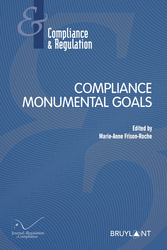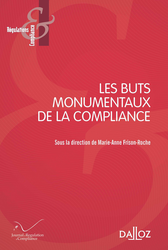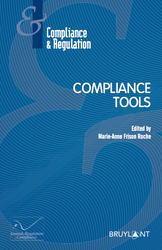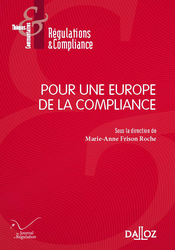June 7, 2023
Newsletter MAFR - Law, Compliance, Regulation

♾️suivre Marie-Anne Frison-Roche sur LinkedIn
♾️s'abonner à la Newsletter MAFR Regulation, Compliance, Law
____
► Référence complète : M.-A. Frison-Roche, "Message personnel", Newsletter MAFR Law, Compliance, Regulation, 7 juin 2023.
____
📧Lire par abonnement gratuit d'autres news de la Newsletter MAFR - Law, Compliance, Regulation
____
🔴 Message personnel sur la construction du Droit de la Compliance
____
📧lire l'article ⤵️
March 15, 2023
Thesaurus : Doctrine

► Full Reference: I. Gavanon, "Data Protection Law in the Digital Economy Confronted to Monumental Goals", in M.-A. Frison-Roche (ed.), Compliance Monumental Goals, coll. "Compliance & Regulation", Journal of Regulation & Compliance (JoRC) and Bruylant, 2023, p. 137-146.
____
📘read a general presentation of the book, Compliance Monumental Goals, in which this article is published.
____
► Summary of the article:
________
March 15, 2023
Publications

♾️ follow Marie-Anne Frison-Roche on LinkedIn
♾️subscribe to the Newsletter MAFR Regulation, Compliance, Law
____
► Full Reference: M.-A. Frison-Roche (ed.), Compliance Monumental Goals, series "Compliance and Regulation", Journal of Regulation & Compliance (JoRC) and Bruylant, 2023, 518 p.
____
► This book in a few words: Seize Compliance by its mind: its Monumental Goals. The notion of "monumental goals" of Compliance was proposed in 2016 by Marie-Anne Frison-Roche📎!footnote-2828. It has become explicit in the texts and the resolution of cases, for example to fight against climate change, make human beings effectively equal, force to be extraterritorially vigilant about suppliers.
Compliance Monumental Goals are targeted ex ante by regulations, contracts, CSR, and international treaties. Creating an alliance between business and political authorities, aiming for a new form of sovereignty. The presence in litigation of these Monumental Goals of global dimension renews the responsibilities and the Judge office. Describing and conceiving these Monumental Goals makes it possible to anticipate Compliance Law, which is more powerful every day.
____
📕 In parallel, a book in French Les Buts Monumentaux de la Compliance, is published in the collection "Régulations & Compliance" co-published by the Journal of Regulation & Compliance (JoRC) and Dalloz.
____
📅 This book follows a cycle of colloquia 2021 organized by the Journal of Regulation & Compliance (JoRC) and its universities partners.
____
📚 This book is inserted in this series created by Marie-Anne Frison-Roche for developing Compliance Law.
📚 read the presentations of the other books of this Compliance Series:
📘M.A. Frison-Roche (ed), Compliance Juridictionnalisation, 2022
📘M.-A. Frison-Roche (ed.), Compliance Tools, 2020
____
► go to the general presentation of this 📚Series Compliance & Regulation, conceived, founded et managed by Marie-Anne Frison-Roche, co-published par the Journal of Regulation & Compliance (JoRC) and Bruylant.
___
► General construction of the book:
The book opens with an Introduction, which proposes the Monumental Goals as definition of Compliance Law putting them at its "beating heart", giving this new branch of law its originality and specificity, explaining what, in the History of the United States and Europe, gave birth to this singular corpus and justifies a substantial definition of Compliance Law. The concept of Monumental Goals is explained, justifying both systemic and political nature of Compliance Law, the practical consequences of which legal specific rules are thus better identified and limited, since Compliance Law does not lead to all-obedience. We can then determine what we can expect from this Law of the Future that is Compliance Law.
From there, the book unfolds in 5 chapters.
A first chapter is devoted to the "radioscopy" of this notion, in itself and branch of Law by branch of Law.
A second chapter aims to measure how the Monumental Goals are questioned by a crisis situation, for example in a health situation, but not in that example, if they aggravate it and must be discarded, or if, on the contrary, they are exactly conceived for this hypothesis. of crisis, risks, catastrophes and that it is advisable to exploit them, in particular in order, in this "test", to benefit from the alliance between the political authorities, public powers and crucial operators.
Once made explicit and tested, the Monumental Goals must find a sure way to be taken into account. This is why a third chapter aims to measure in principle and in practice how the Proportionality method can help the integration of Compliance, thus giving a new dimension to the Law without dragging it into insecurity and illegitimate grabbing of powers.
But because Compliance Monumental Goals express a very great ambition, the question of a bearable, even beneficial relationship with the international competitiveness of companies, standards and systems must be opened. This is the object of the fourth chapter.
Finally, because the Monumental Goals express by nature a new ambition of the Law in a world which must not give up in what could be the prospect of its abyss, the fifth chapter has for object the relationship between the Monumental Goals of Compliance and Sovereignty.
____
► Table of Content :
INTRODUCTION
🕴️Frison-Roche, M.-A., 📝Compliance Monumental Goals, beating heart of Compliance Law
CHAPTER I. THE VERY IDEA OF MONUMENTAL GOALS, THE BEATING HEART OF COMPLIANCE LAW
🕴️Maistre, R.-O., 📝What monumental goals for the Regulator in a rapidly changing audiovisual and digital landscape? ;
🕴️Le Fur, A.-V., 📝Interest and “raison d’être” of the company: how do they fit with the Compliance Monumental Goals? ;;
🕴️Malaurie, M., 📝Monumental goals of Market Law. Reflection on the method
🕴️Peicuti, C. & 🕴️Beyssade, J.,📝The Feminization of Responsability positions in Companies as a Compliance Goal. Example of the banking sector
🕴️Petit, B., 📝The Arrangement of the Monumental Goals of Labor Law: a Moving and Often Paradoxical Whole
🕴️Vaquieri, J.-F.,📝 The "Monumental Goals" perceived by the company. The example of Enedis.
CHAPTER II. IMPLEMENTATION OF COMPLIANCE MONUMENTAL GOALS IN ARTICULATION OF THE MAJOR PRINCIPLE OF PROPORTIONALITY
🕴️Rapp, L., 📝Proportionality and Normativity
🕴️Bär-Bouyssière, B., 📝Practical obstacles to the effective place of Proportionality in Compliance
🕴️Meziani, L., 📝Proportionality in Compliance, the guarantee of public order in companies
🕴️Segonds, M., 📝Compliance, Proportionality and Sanction. The example of the sanctions taken by the French Anticorruption Agency
🕴️Frison-Roche, M.-A., 📝Definition of Proportionality and Definition of Compliance
CHAPTER III. COMPLIANCE MONUMENTAL GOALS TESTED BY CRISIS SITUATIONS
🕴️Oumedjkane, A., 🕴️Tehrani, A. & Idoux, P., 📝Public Norms and Compliance in times of Crisis: Monumental Goals tested: Elements for a Problematic
🕴️Bonnet, J., 📝The Crisis, an opportunity to seize Compliance as a Mode of Communication by Public Authorities
🕴️Frison-Roche, M.-A., 📝Role and Place of Companies in the Creation and Effectiveness of Compliance Law in Crisis
CHAPTER IV. EFFECTIVENESS OF COMPLIANCE MONUMENTAL GOALS AND INTERNATIONAL COMPETITIVENESS
🕴️Deffains, B., 📝The economic challenge of international competitiveness of Compliance
🕴️Marty, F., 📝The Case for Compliance Programs in International Competitiveness: A Competition Law and Economics Perspective
🕴️Frison-Roche, M.-A., 📝Assessment of Whistleblowing, and the obligation of Vigilance
CHAPTER V. COMPLIANCE SUPPORTED BY MONUMENTAL GOALS AND NEW WAY FO SOVEREIGNY
🕴️Bismuth, R., 📝Compliance and Sovereignty: ambiguous relationships
🕴️Pottier, S., 📝In favour of European compliance, a vehicle of economic and political assertion
🕴️André, Ch., 📝State sovereignty, popular sovereignty: what social contract for compliance?
🕴️Frison-Roche, M.-A., 📝The Principle of Active Systemic Proximity, a corollary of the renewal of the Principle of Sovereignty by Compliance Law
________
Updated: March 15, 2023 (Initial publication: May 18, 2021)
Publications

► Full Reference: M.-A. Frison-Roche, "Place and rôle of Companies in the Creation and Effectiveness of Compliance Law in situation of crisis", in M.-A. Frison-Roche (ed.), Compliance Monumental Goals, series "Compliance & Regulation", Journal of Regulation & Compliance (JoRC) and Bruylant, 2023, p.
____
► Article Summary: This article has a very topic: the place of private Companies, regarding the chapter's issue: "the ordeal of a crisis". The crisis constitutes a "test", that is to say, it brings evidence. Let us take it as such.
Indeed, during the health crisis, Companies have helped the Public Authorities to resist the shock, to endure and to get out of the Crisis. They did so by force, but they also took initiatives in this direction. From this too, we must learn lessons for the next crisis that will come. It is possible that this has already started in the form of another global and systemic crisis: the environmental crisis. In view of what we have been able to observe and the evolution of the Law, of the standards adopted by the Authorities but also by the new case law, what can we expect from Companies in the face of this next Crisis, willingly and strength?
____
🚧Read the bilingual Working Paper, with more developments, technical references, and hypertext links.
____
____
► read the presentations of the other Marie-Anne Frison-Roche's contributions in this book:
📝Compliance Monumental Goals, beating heart of Compliance Law,
📝Definition of Principe of Proportionality and Definition of Compliance Law,
📝 Assessment of Whistleblowing and the duty of Vigilance
________
.
March 15, 2023
Editorial responsibilities : Direction of the collection Compliance & Regulation, JoRC and Bruylant

♾️ follow Marie-Anne Frison-Roche on LinkedIn
♾️subscribe to the Newsletter MAFR Regulation, Compliance, Law
____
► Full Reference: M.-A. Frison-Roche (ed.), Compliance Monumental Goals, coll. "Compliance & Regulation", Journal of Regulation & Compliance (JoRC) and Bruylant, 2023, 528 p.
____
► This book in a few words: Seize Compliance by its mind: its Monumental Goals. The notion of "monumental goals" of Compliance was proposed in 2016 by Marie-Anne Frison-Roche📎
Compliance Monumental Goals are targeted ex ante by regulations, contracts, CSR, and international treaties. Creating an alliance between business and political authorities, aiming for a new form of sovereignty. The presence in litigation of these Monumental Goals of global dimension renews the responsibilities and the Judge office. Describing and conceiving these Monumental Goals makes it possible to anticipate Compliance Law, which is more powerful every day.
____
📕 In parallel, a book in French Les Buts Monumentaux de la Compliance, is published in the collection "Régulations & Compliance" co-published by the Journal of Regulation & Compliance (JoRC) and Dalloz.
____
📅 This book follows a cycle of colloquia 2021 organized by the Journal of Regulation & Compliance (JoRC) and its universities partners.
____
📚 This book is inserted in this series created by Marie-Anne Frison-Roche for developing Compliance Law.
📚 read the presentations of the other books of this Compliance Series:
📘M.A. Frison-Roche (ed), Compliance Juridictionnalisation, 2022
📘M.-A. Frison-Roche (ed.), Compliance Tools, 2020
____
► go to the general presentation of this 📚Series Compliance & Regulation, conceived, founded et managed by Marie-Anne Frison-Roche, co-published par the Journal of Regulation & Compliance (JoRC) and Bruylant.
___
► General construction of the book:
The book opens with an Introduction, which proposes the Monumental Goals as definition of Compliance Law putting them at its "beating heart", giving this new branch of law its originality and specificity, explaining what, in the History of the United States and Europe, gave birth to this singular corpus and justifies a substantial definition of Compliance Law. The concept of Monumental Goals is explained, justifying both systemic and political nature of Compliance Law, the practical consequences of which legal specific rules are thus better identified and limited, since Compliance Law does not lead to all-obedience. We can then determine what we can expect from this Law of the Future that is Compliance Law.
From there, the book unfolds in 5 chapters.
A first chapter is devoted to the "radioscopy" of this notion, in itself and branch of Law by branch of Law.
A second chapter aims to measure how the Monumental Goals are questioned by a crisis situation, for example in a health situation, but not in that example, if they aggravate it and must be discarded, or if, on the contrary, they are exactly conceived for this hypothesis. of crisis, risks, catastrophes and that it is advisable to exploit them, in particular in order, in this "test", to benefit from the alliance between the political authorities, public powers and crucial operators.
Once made explicit and tested, the Monumental Goals must find a sure way to be taken into account. This is why a third chapter aims to measure in principle and in practice how the Proportionality method can help the integration of Compliance, thus giving a new dimension to the Law without dragging it into insecurity and illegitimate grabbing of powers.
But because Compliance Monumental Goals express a very great ambition, the question of a bearable, even beneficial relationship with the international competitiveness of companies, standards and systems must be opened. This is the object of the fourth chapter.
Finally, because the Monumental Goals express by nature a new ambition of the Law in a world which must not give up in what could be the prospect of its abyss, the fifth chapter has for object the relationship between the Monumental Goals of Compliance and Sovereignty.
____
► Table of Content :
INTRODUCTION
🕴️M.-A. Frison-Roche, 📝Main Aspects of the Book. The Monumental Goals of Compliance Law
🕴️M.-A. Frison-Roche, 📝Compliance Monumental Goals, Beating Heart of Compliance Law
CHAPTER I. THE VERY IDEA OF MONUMENTAL GOALS, THE BEATING HEART OF COMPLIANCE LAW
🕴️R.-O. Maistre, 📝What are the Monumental Goals for the Regulator in a Rapidly Changing Audiovisual and Digital Landscape?
🕴️A.-V. Le Fur, 📝Interest and “raison d’être” of the Company: How Does It Fit Together with the Compliance Monumental Goals?
🕴️A. Le Goff, 📝Monumental Goals Perceived by the Firm: Serene Business or Business under Pressure?
🕴️J.-F. Vaquieri, 📝The “Monumental Goals of Compliance” from the Company’s Perspective – the Case of Enedis
🕴️M. Malaurie-Vignal, 📝Monumental Goals of Market Law - Reflection on the Method
🕴️C. Peicuti et 🕴️J. Beyssade,📝Feminisation of Positions of Responsibility in the Workplace as a Goal of Compliance. Example of the Banking Sector
🕴️I. Gavanon, 📝Data Protection Law in the Digital Economy Confronted to Monumental Goals
🕴️B. Petit, 📝The Monumental Goals of (European) Labour Law: a Changing System with Balances to be Consolidated
🕴️G. Beaussonie, 📝Do Criminal Law and Compliance Form a System?
🕴️Ch. Huglo,📝Under what Conditions could Climate Law Constitute a Priority Monumental Goal?
CHAPTER II. IMPLEMENTATION OF COMPLIANCE MONUMENTAL GOALS IN ARTICULATION WITH THE MAJOR PRINCIPLE OF PROPORTIONALITY
🕴️L. Rapp, 📝Compliance, Proportionality and Normativity
🕴️B. Bär-Bouyssière, 📝Proportionality and Compliance
🕴️A. Mendoza-Caminade, 📝Proportionality and Evaluation. The Example of Intellectual Property Law
🕴️L. Meziani, 📝Proportionality in Compliance, the Guarantee of Public Order in Companies
🕴️M. Segonds, 📝Compliance, Proportionality and Sanction. A French Perspective
🕴️M.-A. Frison-Roche, 📝Definition of Proportionality and Definition of Compliance Law
CHAPTER III. COMPLIANCE MONUMENTAL GOALS TESTED BY CRISIS SITUATIONS
🕴️A. Oumedjkane, A. Tehrani et P. Idoux, 📝Public Norms and Compliance in Crisis Periods: Testing Monumental Goals. A Few Thoughts
🕴️J. Bonnet, 📝The Crisis, an Opportunity to Seize Compliance as a Mode of Communication for Public Authorities
🕴️M.-A. Frison-Roche, 📝Place and Role of Companies in the Creation and Effectiveness of Compliance Law in Crisis
CHAPTER IV. EFFECTIVENESS OF COMPLIANCE MONUMENTAL GOALS AND INTERNATIONAL COMPETITIVENESS
🕴️B. Deffains, 📝Compliance and International Competitiveness
🕴️J.-Ch. Roda, 📝Compliance, Internal Investigations and International Competitiveness: What are Risks for the French Companies (in the Light of Antitrust Law)?
🕴️F. Marty, 📝The Case for Compliance Programs in International Competitiveness: A Competition Law and Economics Perspective
🕴️S. Lochmann, 📝ESG Rating Agencies and Compliance as an Effective Way of Increasing International Competitiveness
🕴️M.-A. Frison-Roche, 📝Assessment of Whistleblowing and Vigilance Obligation with regard to International Competitiveness
CHAPTER V. COMPLIANCE SUPPORTED BY MONUMENTAL GOALS, A NEW WAY FOR SOVEREIGNTY
🕴️R. Bismuth, 📝The Ambiguous Relations between Corporate Compliance and Sovereignty
🕴️L. Benzoni, 📝International Trade, Competitivity and Sovereignty: Towards a Political Economy of Compliance
🕴️S. Pottier, 📝In Favour of European Compliance, a Vehicle of Economic and Political Assertion
🕴️Ch. André, 📝State Sovereingty, Sovereingty of the People: What Social Contract for Compliance?
🕴️M.-A. Frison-Roche, 📝The Principle of Active Systemic Proximity: Corollary of the Renewal of the Principle of Sovereignty by Compliance Law
________
🕴️M.A. Frison-Roche, 📝Compliance Law, 2016.
March 15, 2023
Thesaurus : Doctrine

► Full Reference: A. Mendoza-Caminade, "Proportionality and Evaluation. The Example of Intellectual Property Law", in M.-A. Frison-Roche (ed.), Compliance Monumental Goals, coll. "Compliance & Regulation", Journal of Regulation & Compliance (JoRC) and Bruylant, 2023, p. 221-236.
____
📘read a general presentation of the book, Compliance Monumental Goals, in which this article is published.
____
► Summary of the article:
________
Sept. 1, 2022
Editorial responsibilities : Direction of the collection "Regulations & Compliance", JoRC & Dalloz

♾️ follow Marie-Anne Frison-Roche on LinkedIn
♾️ subscribe to the Newsletter MAFR Regulation, Compliance, Law
____
► Full Reference: M.-A. Frison-Roche (ed.), Les Buts Monumentaux de la Compliance (Compliance Monumental Goals), coll. "Régulations & Compliance", Journal of Regulation & Compliance (JoRC) and Dalloz, 2022, 520 p.
____
📘In parallel, the English version of this book, Compliance Monumental Goals, is published in the collection co-published by the Journal of Regulation & Compliance (JoRC) and Bruylant.
____
📅This book comes after a cycle of colloquia 2021 organised by the Journal of Regulation & Compliance (JoRC)and its Universities partners.
____
This volume is the continuation of the books dedicated to Compliance in this collection.
📚Read the other books' presentations of the collection about Compliance:
🕴️M.-A. Frison-Roche (ed.), 📕La juridictionnalisation de la Compliance, 2023
🕴️M.-A. Frison-Roche (ed.), 📕Les outils de la Compliance, 2021
🕴️M.-A. Frison-Roche (ed.), 📕Pour une Europe de la Compliance, 2019
🕴️N. Borga, 🕴️J.-Cl. Marin &🕴️J.-Ch. Roda (ed.), 📕Compliance : l'Entreprise, le Régulateur et le Juge, 2018
🕴️M.-A. Frison-Roche (ed.), 📕Régulation, Supervision, Compliance, 2017
🕴️M.-A. Frison-Roche (ed.),📕 Internet, espace d'interrégulation, 2016
📚Read the presentations of the other titles of the collection.
____
► General presentation of the book: Seize Compliance by its mind: its Monumental Goals. The notion of "monumental goals" of Compliance was proposed in 2016 by Marie-Anne Frison-Roche📎
Compliance Monumental Goals are targeted ex ante by regulations, contracts, CSR, and international treaties. Creating an alliance between business and political authorities, aiming for a new form of sovereignty. The presence in litigation of these Monumental Goals of global dimension renews the responsibilities and the Judge office. Describing and conceiving these Monumental Goals makes it possible to anticipate Compliance Law, which is more powerful every day.
____
🏗️General construction of the book : The book opens with a double Introduction, the first summarizing the book (in free access) and the second, more substantial, proposing the Monumental Goals as definition of Compliance Law putting them at its "beating heart", giving this new branch of law its originality and specificity, explaining what, in the History of the United States and Europe, gave birth to this singular corpus and justifies a substantial definition of Compliance Law. The concept of Monumental Goals is explained, justifying both systemic and political nature of Compliance Law, the practical consequences of which legal specific rules are thus better identified and limited, since Compliance Law does not lead to all-obedience. We can then determine what we can expect from this Law of the Future that is Compliance Law.
From there, the book unfolds in 5 titles.
A first Title is devoted to the "radioscopy" of this notion, in itself and branch of Law by branch of Law.
A second Title aims to measure how the Monumental Goals are questioned by a crisis, for example in a health situation, but not in that example, if they aggravate it and must be discarded, or if, on the contrary, they are exactly conceived for this hypothesis. of crisis, risks, catastrophes and that it is advisable to exploit them, in order, in this "test", to benefit from the alliance between the political authorities, public powers and crucial operators.
Once made explicit and tested, the Monumental Goals must find a sure way to be considered. Therefore a third Title aims to measure in principle and in practice how the Proportionality method can help the integration of Compliance, thus giving a new dimension to the Law without dragging it into insecurity and illegitimate grabbing of powers.
But because Compliance Monumental Goals express a very great ambition, the question of a bearable, even beneficial relationship with the international competitiveness of companies, standards and systems must be opened. This is the object of the fourth Title.
Finally, because the Monumental Goals express by nature a new ambition of the Law in a world which must not give up in what could be the prospect of its abyss, the fifth Title has for object the relationship between the Monumental Goals of Compliance and Sovereignty.
____
► Understand the book through the Table of Contents and the summaries of each article:
DOUBLE INTRODUCTION
🕴️M.-A. Frison-Roche, 📝Résumé de l'ouvrage Les buts monumentaux du droit de la compliance (free access : click here to read this article (in French))
🕴️M.-A. Frison-Roche, 📝Les Buts Monumentaux, cœur battant du Droit de la Compliance
I. LA NOTION DE BUTS MONUMENTAUX DE LA COMPLIANCE ("THE IDEA OF COMPLIANCE MONUMENTAL GOALS")
🕴️R.-O. Maistre, 📝Quels buts fondamentaux pour le régulateur dans un paysage audiovisuel et numérique en pleine mutation ?
🕴️A.V. Le Fur, 📝Intérêt et raison d’être de l’entreprise : quelle articulation avec les Buts Monumentaux de la Compliance ?
🕴️A. Le Goff, 📝La part des banques dans la concrétisation des Buts Monumentaux de la Compliance
🕴️J.-F. Vaquieri,📝Les "Buts Monumentaux" perçus par l'entreprise. L'exemple d'Enedis
🕴️M. Malaurie-Vignal, 📝Les Buts Monumentaux du droit du marché. Réflexion sur la méthode
🕴️D. de La Garanderie, 📝Sur les Buts Monumentaux de la Compliance sociale
🕴️C. Peicuti & 🕴️J. Beyssade, 📝La féminisation des postes à responsabilité dans les entreprises comme But de la Compliance. Exemple du secteur bancaire
🕴️I. Gavanon, 📝Le droit des données personnelles dans l’économie numérique à l’épreuve des Buts Monumentaux
🕴️B. Petit, 📝Les Buts Monumentaux du droit (européen) des relations de travail : un système mouvant aux équilibres à consolider
🕴️G. Beaussonie, 📝Droit pénal et Compliance font-ils système ?
🕴️Ch. Huglo, 📝À quelles conditions le Droit climatique pourrait-il constituer un But Monumental prioritaire ?
II. MISE EN OEUVRE DES BUTS MONUMENTAUX DE LA COMPLIANCE EN ARTICULATION DU PRINCIPE MAJEUR DE LA PROPORTIONNALITÉ ("IMPLEMENTATION OF COMPLIANCE MONUMENTAL GOALS IN ARTICULATION OF THE MAJOR PRINCIPLE OF PROPORTIONALITY")
🕴️L. Rapp, 📝Conformité, proportionnalité et normativité
🕴️B. Bär-Bouyssière, 📝Les obstacles pratiques à la place effective de la proportionnalité dans la Compliance
🕴️A. Mendoza-Caminade, 📝Compliance, proportionnalité et évaluation
🕴️L. Meziani, 📝Proportionnalité en Compliance, garant de l’ordre public en entreprise
🕴️M. Segonds, 📝Compliance, proportionnalité et sanction
🕴️M.-A. Frison-Roche, 📝Définition du principe de proportionnalité et définition du Droit de la Compliance
III. LES BUTS MONUMENTAUX DE LA COMPLIANCE ÉPROUVÉS PAR LES SITUATIONS DE CRISES ("THE COMPLIANCE MONUMENTAL GOALS TESTED BY CRISIS SITUATIONS")
🕴️A. Oumedjkane, A. Tehrani et P. Idoux, 📝Normes publiques et Compliance en temps de crise : les Buts Monumentaux à l'épreuve. Éléments pour une problématique
🕴️J. Bonnet, 📝La crise, occasion de saisir la Compliance comme mode de communication des autorités publiques
🕴️M.-A. Frison-Roche, 📝Place et rôle des entreprises dans la création et l'effectivité du Droit de la Compliance en cas de crise
IV. EFFECTIVITÉ DES BUTS MONUMENTAUX DE LA COMPLIANCE ET COMPÉTITIVITÉ INTERNATIONALE ("EFFECTIVENESS OF COMPLIANCE MONUMENTAL GOALS AND INTERNATIONAL COMPETITIVENESS")
🕴️B. Deffains, 📝L’enjeu économique de compétitivité internationale de la Compliance
🕴️F. Marty, 📝L'apport des programmes de conformité à la compétitivité internationale : une perspective concurrentielle
🕴️S. Lochmann, 📝Les agences de notation ESG et l'effectivité de la Compliance face à la compétitivité internationale
🕴️M.-A. Frison-Roche, 📝Appréciation du lancement d'alerte et de l'obligation de vigilance au regard de la compétitivité internationale
V. LA COMPLIANCE PORTÉE PAR LES BUTS MONUMENTAUX, NOUVELLE VOIE DE SOUVERAINETÉ ("COMPLIANCE SUPPORTED BY MONUMENTAL GOALS AND NEW WAY OF SOVEREIGNTY")
🕴️R. Bismuth, 📝Compliance et souveraineté : relations ambigües
🕴️L. Benzoni, 📝Commerce international, compétitivité des entreprises et souveraineté : vers une économie politique de la Compliance
🕴️M.-A. Boursier, 📝Les Buts Monumentaux de la Compliance : mode d'expression des États
🕴️S. Pottier, 📝Pour une Compliance européenne, vecteur d'affirmation économique et politique
🕴️Ch. André, 📝Souveraineté étatique, souveraineté populaire : quel contrat social pour la Compliance ?
🕴️M.-A. Frison-Roche, 📝Le principe de proximité systémique active, corollaire du renouvellement du principe de souveraineté par le Droit de la Compliance
________
M.-A. Frison-Roche, "Le droit de la compliance", 2016
Sept. 1, 2022
Thesaurus : Doctrine

► Full Reference : G. Beaussonie, "Droit pénal et Compliance font-ils système ?" ("Do Criminal Law and Compliance form a system?"), in M.-A. Frison-Roche (ed.), Les Buts Monumentaux de la Compliance, coll. "Régulations & Compliance", Journal of Regulation & Compliance (JoRC) and Dalloz, 2022, p. 157-166.
____
📕read a general presentation of the book, Les Buts Monumentaux de la Compliance, in which this article is published
____
► Summary of the article (done by the Journal of Regulation & Compliance): By nature, Criminal Law is a system that is not intended to develop, principles which limit it being internal to it. Nevertheless if Proportionality is respected, its extension may be legitimate to preserve “fundamental social values” because Criminal Law is the branch of Law concerning what is grave, grave in consequences as in causes.
Not always being concerned by Efficiency, the temptation is important to supplement Criminal Law with other repressive mechanisms , not only Administrative Repression but today Compliance which pursues concordant objectives and aims by the "Goals Monumental ”to what would be most important and therefore for which Efficiency would be required, in particular because victory (for example against corruption) should be global.
Efficiency is obtained by the internalisation in powerful companies, but this efficiency comes at a price and Criminal Law should not impose too many obligations to do maintaining only a potential link with the commission of a "real offense ”. Its association with Compliance can therefore also only be exceptional and must not lead to forget that Freedom must always remain the principle.
________
March 5, 2022
Compliance: at the moment

June 2, 2021
Publications

► Full reference : Frison-Roche, M.-A., Building by Law the Unicity of Compliance Tools from the Definition of Compliance Law by its "Monumental Goals", in Frison-Roche, M.-A. (ed.), Compliance Tools, serie "Régulations & Compliance", Journal of Regulation & Compliance (JoRC) and Bruylant, 2021, pp. 35-46
Summary of the article : The "tools of Compliance" do not stack on top of each other. They form a system, thanks to a unity drawn from the goals that all these multiple and different tools serve: the "Monumental Goals" by which Compliance Law is defined.
All these tools are configured by these goals and for mastering all these techniques, it is essential to put them all in perspective of what Compliance Law is, which is designed teleologically with regard to its goals. Extension of Regulatory Law and like it, Compliance Law is built on a balance between the principle of competition and other concerns that public authorities claim to take care of. Compliance Law has moreover more "pretensions" in this respect, for example in environmental matters. All the means are then good, the violence of the tools marrying without difficulty with the voluntary commitments since it is the goals which govern this branch of Law.
As legal solutions adopted show, a common method of interpretation and common levels of constraint for all Compliance Tools result from this definition. Starting from the goals (in which legal normativity is housed), the interpretation of the different tools is thus unified. Moreover, the different degrees of constraint do not operate according to the consideration of sources (traditional legal criterion) but by the goals, according to the legal distinction between obligations of means and obligations of results which result from the articulation between tools, of which the establishment is an obligation of result, and the goal, of which the achievement is only an obligation of means.
____
📝 Read the bilingual working paper on which rely this article.
📝 Read a general presentation of the book in which this article has been published.
____

May 15, 2021
Publications

 Full Reference: Frison-Roche, M.-A. Place and Role of Companies in the Creation and Effectiveness of Compliance Law in Crisis, Working Paper, May 2021.
Full Reference: Frison-Roche, M.-A. Place and Role of Companies in the Creation and Effectiveness of Compliance Law in Crisis, Working Paper, May 2021.
____
This Working Paper has been elaborated as basis for a conference in the colloquium of Mai 17, 2021 (done in French: Normes publiques et Compliance en temps de crise : les buts monumentaux à l'épreuve.
This video is made with English substitutes.
It is also the basis for an article in the book Compliance Monumental Goals, the English version of which is co-published by the Journal of Regulation & Compliance (JoRC) and Bruylant.
Summary: This article has a very topic: the place of private Companies, with regard to the chapter's issue: "the ordeal of a crisis". The crisis constitutes a "test", that is to say, it brings evidence. Let us take it as such.
Indeed, during the health crisis, it appears that Companies have helped the Public Authorities to resist the shock, to endure and to get out of the Crisis. They did so by force, but they also took initiatives in this direction. From this too, we must learn lessons for the next crisis that will come. It is possible that this has already started in the form of another global and systemic crisis: the environmental crisis. In view of what we have been able to observe and the evolution of the Law, of the standards adopted by the Authorities but also by the new case law, what can we expect from Companies in the face of this next Crisis, willingly and strength
Lire ci-dessous les développements.
March 23, 2021
Thesaurus : Soft Law

Full reference: Bayrou, F., Electricité: le devoir de lucidité (Electricity: the duty of lucidity), note n°4 from the Haut-Commissariat au Plan (French government planification agency), 23rd of March 2021, 37 p.
Read the note (in French)
Read the summary of the note done by the Haut-Commissariat au Plan on is official website (in French)
March 10, 2021
Teachings : Banking and Financial Regulatory Law - Semester 2021

Résumé de la dernière leçon : La Compliance, ne serait-ce que par ce terme même, est un mécanisme nouveau dans les systèmes juridiques européens, venant notamment en convergence du Droit de la concurrence, du Droit financier et du Droit du commerce international. L'on considère généralement qu'il provient du Droit financier et du Droit américain, qui développe ainsi d'une façon extraterritoriale ses conceptions juridico-financières.
Est ainsi en train de naître un Droit de la Compliance.
Il pourrait être celui qui disciplinerait l'économie numérique, laquelle croise étroitement l'économie bancaire et financière, qu'elle renouvelle.
Pour en mesurer l'importance et le développement, qui ne font que commencer, le plus probant est de commencer par sa manifestation incontestable en Droit français, à savoir la loi du 9 décembre 2016 de la loi dite "Sapin 2", suivant de peu la loi du 21 juin 2016 sur les abus de marché et suivie de peu par la loi du 27 mars 2017 sur le devoir de vigilance des sociétés donneuses d'ordre.
Revenir aux bases avec le Dictionnaire bilingue du Droit de la Régulation et de la Compliance
Approfondir grâce à la Bibliographie générale du cours de Droit de la Régulation bancaire et financière
Revenir au plan général du cours de Droit de la Régulation bancaire et financière
Revenir à la présentation générale du cours de Droit de la Régulation bancaire et financière
Parcourir les billets quotidiens d'actualité sur la Compliance.
Utiliser les matériaux ci-dessous pour aller plus loin et préparer votre conférence de méthode:

Updated: Dec. 21, 2020 (Initial publication: Dec. 11, 2019)
Publications

This working document serves as the basis for two conference given in the symposium made under the direction of Lucien Rapp, Les incitations, outils de la Compliance ("Incitations: Compliance Tools").
Référence : Frison-Roche, M.-A., Compliance et Incitations : un couple à propulser, in Faculté de droit de l'Université Toulouse-Capitole, et Journal of Regulation & Compliance (JoRC),Les incitations, outils de la Compliance, 12 décembre 2019, Toulouse.
This Working Paper has been the basis for two conferences in the colloquium in Toulouse (France) under the scientific direction of Lucien Rapp, about Les incitations, outils de la Compliance ("Incitations, as Compliance Tools"), on December 12, 2019, the first one about The sanction as incitation and the second one about Incitations and Compliance Law (synthesis of this colloquium). sur le thème de la sanction comme incitation, la seconde en synthèse de ce colloque sur
After it has been the basis for the article, to be published in the books Les outils de la Compliance and Compliance Tools in the Series Régulations & Compliance.
Read a general presentation of this book.
____
Summary of this Working Paper: Compliance and Incentives appear at first glance to be totally opposite. Not only because sanctions are at the heart of Compliance and that sanction is associated with constraint while incentive is associated with non-constrained
To do this, the concept of “incentive Compliance” should be developed. This concept is not only appropriate, but it is necessary in a new conception of Sovereignty. For example for the digital Europe.
_________
Read the developments below.
Voir cette question analysée d’une façon autonome, Frison-Roche, M.A., Résoudre la contradiction entre « sanction » et « incitation » sous le feu du Droit de la Compliance, 2020.
Dec. 1, 2020
Newsletter MAFR - Law, Compliance, Regulation

Full reference: Frison-Roche, M.-A., New SEC Report to Congress about Whistleblower Program: what is common between American and European conception, Newsletter MAFR - Law, Compliance, Regulation, 1st of December 2020
Read by freely subscribing other news of the Newsletter MAFR - Law, Compliance, Regulation
Summary of the news
Like every year since the adoption of the Dodd-Frank Act, the Securities and Exchanges Commission (SEC) and especially its Office of the Whistleblowers (OWB) handed to the Congress of the United-States a report about the success of its program concerning whistleblowers, especially estimated with the amount of financial rewards granted to them during the year. This report especially presents the amount granted to whistleblowers, the quality of the collected information and the efficacy of SEC's whistleblowers' protection process.
If Americans condition the effectiveness of whistleblowing to the remuneration of whistleblowers, Europeans oppose the "ethical whistleblower" who shares information for the love of Law to the "bounty hunter" uniquely motivated by financial reward and favor the former to the later, as it is proven in the French Law Sapin II of 2016 (which do not propose financial reward to whistleblowers) or the British Public Interest Disclosure of 1998 (which just propose a financial compensation of the whistleblower's losses linked to whistleblowing).
However, American and European conceptions are not so far from each other. As United-States, Europe has a real care for legal effectivity, even if, because of their different legal traditions, Americans favor effectivity of rights while European favor effectivity of Law. If it places effectivity at the center of its preoccupations, Europe should conceive with less aversion the possibility to financially incite whistleblowers. Moreover, United-States and Europe share the same common willingness to protect whistleblowers and if rewarding would enable a better protection, then Europe should not reject it, as shows the recent declarations of the French Defenders of Rights. It is not excluded that both systems converges in a close future.
Nov. 23, 2020
Interviews

Full reference: Frison-Roche, M.-A., Facebook: Quand le Droit de la Compliance démontre sa capacité à protéger les personnes (Facebook: When Compliance Law proves its ability to protect people), interview with Olivia Dufour, Actu-juridiques Lextenso, 23rd of November 2020
Read the interview (in French)
Read the news of the Newsletter MAFR - Law, Compliance, Regulation about this question
Nov. 18, 2020
Conferences
🎥Compliance Law, an adequate legal framework for GAIA-X, in 🧮GaiaX Summit2020, The World with GAIA-X

► Full Reference: M.-A. Frison-Roche, "Compliance Law, an adequate legal framework for GAIA-X", in Pan-European GAIA - X Summit, The World with GAIA-X, November18, 2020.
____
🧮See the general presentation of the Summit
____
📈See the slides, basis of this intervention.
____
► Summary of the intervention: Europe may offer an adequate legal framework for the GAIA-X project through Compliance Law. Compliance Law is a new form for Regulatory Law, driven by "Monumental Goals", negative Monumental Goals, for instance prevention of systemic failures, and positive Monumental Goals, for instance innovation or stability. This very new branch of Law works on these Monumental Goals, which must be explicit and internalized in Crucial Enterprises. These Crucial Enterprises concretize these Goals, supervised by public Authorities.
European Compliance Law already works, for instance about Personal Data protection (case law and GDPR) or prevention banking systemic failures (Banking Union), Compliance Tools being in balance with Competition principle. European Union Law is moving from the Ex-Post Competition Law to the Ex-Ante Compliance Law, internalizing Monumental Goals in Crucial Enterprises.
There is a perfect adequacy between European Compliance Law and GAIA-X. This project built by Crucial Enterprises must be supervised by public authority, maybe a specific or the European Commission. The governance of GAIA-X must be transparent and accountable. This private organization must use it powers in respect of the proportionality principle, controlled by the public supervisory body. The legal framework is required but it is sufficient.
___
📈see the slides, basis of this intervention.
____
🎥watch the video of this intervention.
________

Updated: Nov. 13, 2020 (Initial publication: July 15, 2020)
Publications

Référence : Frison-Roche, M.-A., Building by Law the unity of Compliance Tools from the definition of Compliance Law by its "Monumental Goals"", Working Paper 2020.
This Working Paper has been the basis for an article in the collective book Compliance Tools, 2020
___
Working Paper summary: The "tools of Compliance" do not stack on top of each other. They form a system, thanks to a unity drawn from the goals that all these multiple and different tools serve: the "Monumental Goals" by which Compliance Law is defined.
All these tools are configured by these goals and in order to master all these techniques, it is essential to put them all in perspective of what Compliance Law is, which is designed teleologically with regard to its goals. Extension of Regulatory Law and as, Compliance Law is built on a balance between the principle of competition and other concerns that public authorities claim to take care of. Compliance Law has moreover more "pretensions" in this respect, for example in environmental matters. All the means are then good, the violence of the tools marrying without difficulty with the voluntary commitments since it is the goals which govern this branch of Law.
As adopted legal solutions show, a common method of interpretation and common levels of constraint for all Compliance Tools result from this definition. Starting from the goals (in which legal normativity is housed), the interpretation of the different tools is thus unified, without the necessity of a legislation including all these Compliance tools. Moreover, the different degrees of constraint do not operate according to the consideration of sources (traditional legal criterion) but by the goals, according to the legal distinction between obligations of means and obligations of results which result from the articulation between tools, of which the establishment is an obligation of result, and the goals, of which the achievement is only an obligation of means.

Nov. 1, 2020
Publications

This working paper served as a basis for an interview organized by Olivia Dufour in French in Actu-juridiques-Lextenso on 11st of January 2021.
Sept. 16, 2020
Publications

🌐follow Marie-Anne Frison-Roche on LinkedIn
🌐subscribe to the Newsletter MAFR Regulation, Compliance, Law
____
Full reference: M.-A. Frison-Roche, Se tenir bien dans l'espace numérique, in Penser le droit de la pensée. Mélanges en l'honneur de Michel Vivant, Lexis Nexis and Dalloz, 2020, pp. 155-168.
____
📝Read the article (in French)
____
English summary of the article: The digital space is one of the scarce spaces not framed by a specific branch of Law, Freedom also offering opportunity to its actors to not "behave well", that is to express and diffuse broadly and immediately hateful thoughts through Hate speechs, which remained before in private or limited circles. The intimacy of Law and of the legal notion of Person is broken: Digital permits to individuals or organizations to act as demultiplied and anonymous characters, digital depersonalized actors who carry behaviors that are hurtful to other's dignity.
Against that, Compliance Law offers an appropriate solution: internalizing in digital crucial operators the mission to disciplinary and substantially hold the digital space. The digital space has been structured by powerful firms able to maintain order. Because Law must not reduce digital space to be only a neutral market of digital prestations, these crucial operators, like social networks or search engines, must be forced to substantially control behaviors. It could be about an obligation of internet users to act with their face uncover, "real identity" policy controlled by firms, and to respect others' rights, privacy rights, dignity, intellectual property rights. In their Regulatory function, digital crucial firms must be supervised by public authorities.
Thus, Compliance law substantially defined is the protector of the person as "subject of law" in the digital space, by the respect that others must have, this space passing from the status of free space to the one of civilized space, in which everyone is obliged to behave well.
______
Read to go further:
- Frison-Roche, M.-A., L'apport du Droit de la Compliance à la gouvernance d'Internet, 2019
- Frison-Roche, M.-A. (dir.), Internet, un espace d'interrégulation, 2016
Aug. 10, 2020
Newsletter MAFR - Law, Compliance, Regulation

Full reference : Frison-Roche, M.-A., The practical utility to have a firm definition of "Compliance", Newsletter MAFR - Law, Compliance, Regulation, 10th of August 2020.
Read by subscribing the other news in the Newsletter MAFR - Law, Compliance, Regulation
Summary of the news
Some says that defining Compliance is a theoretical and non useful exercice that should be left aside to tackle the study of concrete technical cases. However, to be able to use Compliance tools, it is first necessary to have a clear, firm and simple idea of what is Compliance. Moreover, the future of this new branch of law intensely depends on the definition we choose to use.
Compliance Law gives to some crucial private firms new responsibilities such as the one to fight against global dangers or the one of saving the planet. In this, Compliance Law can be perceived as a kind of new deal between the private sector and public authorities, with the only difference that this time the consent of the private sector is not required.
Some would say that the concretization of such projects is the duty of the State and that private firms, if they must respect the rules, do not have to find a way to concretize a "monumental goal". However, the world face new and systemic dangers in the face of which the State alone is powerless, technically or geographically, and against which crucial companies can act.
It is not about, as some advocate to put human being aside of Compliance Law by letting machines decide. It is about placing the human being and its protection at the heart of Compliance Law. In this, Compliance Law can become a new humanism.
To go further, read Marie-Anne Frison-Roche's working paper, The Dreamed Compliance Law
July 25, 2020
Thesaurus : Doctrine
Full reference: Thouret, T., Le pharmacien, un "opérateur crucial" pour prévenir une crise des opiacés en France, Actu-juridiques, Lextenso, 2020
Lire l'article (in French)

March 22, 2020
Publications

This working paper is the basis for an article in the French Law Journal Le Clunet.
When we compare the terms "Compliance" and "Extraterritoriality", it is often with dissatisfaction, even anger and indignation. On the momentum, after having expressed a principle of disapproval of such a merger, attention is focused on how we can fight against it, to break the link between Compliance and Extraterritoriality. But do we have to go so fast? Is this negative initial assessment correct?
Indeed, thus gone, it is frequently explained that the binding mechanisms of Compliance are suffered, that they come from abroad!footnote-1750, that they apply with efficiency but in an illegitimate way, without agreement of the one who must submit to it, whose resistance is therefore certainly ineffective but nevertheless justified. In the same spirit, when we start to shell the cases, like so many scars, sort of rosary, even crown of thorns, BNPP case!footnote-1718, Astom case!footnote-1717, etc., the wounds not yet closed turn into reproaches made against the rules, public authorities, even reproaches made against named people.
We are leaving this kind of complaint against X, which targets what would be this appalling "Compliance", this Law which would be both hostile and mechanical which would not have been able to stay within the limits of borders, Compliance being thus placed in contrast to sovereignty and protection, which presuppose staying within its limits!footnote-1716 and being able to protect companies from abroad. More concretely, this presentation targets more directly the United States, which uses "the legal weapon", slipped under what is then designated as "the artifice of the Law" with extraterritorial scope. But this effect would in reality be the very object of the whole: their hegemonic will to better organize at least a global racket, notably through the Foreign Corrupt Practices Act (FCPA) and at best a world government through notably the embargoes.Those who believed otherwise would be naive or foolish. This silences the opponents because who likes this costume? So the world would be put in a ruled cut; what the mafia could not have done, Compliance Law would have obtained, offering the whole world to the United States thanks to the extraterritoriality of its national Law.
Compliance Law would thus become the very negation of Law, since it has the effect, even the purpose (barely concealed by strategic, powerful and shameless States), of counting borders for nothing, whereas Public International Law, in that it is built between the sovereign subjects of law that are the States presupposes the primary respect for borders to better exceed them while Private International Law takes the same postulate to better welcome foreign Law in situations presenting a foreign element!footnote-1726. Jurists believed in the force of Law; by Compliance, we would return to the sad reality that only the powerful, here the United States, dominate and - ironically - it is under the pretext of Law that they do it. It would be necessary to be well duped, or accomplice, to see there still legal where there is only the balance of powers. When one is more intelligent or skilful than that, one understands that the "small" can only be "subject" to the Compliance Law, one would have to be powerful to be the normative source and its enforcement agent. It is then towards this mis-named Department of Justice (DoJ) that the fearful, hateful and resigned glances turn.
If you see it that way, what should you do then? The answer is obvious: react!
It is necessary to save the sovereignty, France, companies, the Law itself. If that is how the question is posed, how can we disagree? It is therefore necessary to destroy the Compliance Law and the extra-territoriality of American Law which had found this "Trojan horse", an expression so frequently used. This is the basis for the administrative reports available, for example the Berger-Lellouche!footnote-1719 parliamentary reports and the Gauvainfootnote-1720 report. Both of them broadly develop the two preceding claims, namely that the extra-priority of compliance mechanisms is illegitimate and harmful, since it is a mechanism invented by the Americans and harming the Europeans, or even invented by the Americans to harm Europeans, the description being made in much more violent terms than those used here. The description seems acquired, the reflections therefore relate to the remedies. The reaction is most often to "block" the Compliance Law in its extraterritorial effect.
But without discussing the effectiveness of the remedies proposed downstream, it is necessary to return to this description so widely shared made upstream. Because many elements on the contrary lead to affirm that ComplianceLaw first of all and by nature can only be extraterritorial and that it must be. Whether or not the State in which it was created has malicious intentions. The description which is made to us most often describes particular cases from which we draw generalities, but we cannot reduce Compliance Law to the already cooled cases, as BNPP case, or to the always hot case of the American embargo on Iran. Furthermore, one cannot take the issue of embargoes and draw conclusions, legitimate for it, but which would apply to the whole of Compliance Law. The fact that theCompliance Law is a branch of Law at the stage still of emergence can lead to this confusion which consists in taking the part for the whole, but it is very regrettable because what is justified for the embargoes does not is in no way relevant for all Compliance Law, of which precisely the Law of embargoes is only a small part, even an abusive use. This overlapping is not often perceived, because the definition of Compliance Law and its criterion are not clearly enough defined, namely the existence of a "monumental goal"!footnote-1725, which does not exist in an embargo decided unilaterally by an order decreed by the President of the United States, but which exists in all other cases and fully justifies extraterritoriality, extraterritoriality which is even consubstantial with Compliance Law (I).
Once we have distinguished the embargoes, as an atypical, sometimes even illegitimate part, of Compliance Law, we should continue this work of distinction by emphasizing that the United States has certainly invented Compliance Law!footnote-1721 but only developed a mechanical concept for the prevention and management of systemic risks. Europe has taken up this systemic conception of the protection of systems, for example financial or banking, but superimposed another conception, drawing on its deep humanist tradition!footnote-1722, whose protection of personal data is only an example and whose monumental goal is the protection of the human being. This primary concern then justifies the European use of Compliance mechanisms to interfere with global objects regardless of their location, especially the environment, and to block the entry onto the ground of objects that enter, which is contrary to Competition Law but builds a legitimate barrier under this Compliance Law, in the indifference of an extraterritorial origin (II).
Indeed, this branch of the new Law which is Compliance Law is not reducible to Competition Law!footnote-1723, any more than it is not reducible to a method. It is a substantial, extraterritorial Law because the "monumental goals" which give it substantial unity are extraterritorial. This can directly contribute to the future of a Europe which on the one hand will be able to pursue, in an extraterritorial manner, monumental humanist goals, in the field of the environment or the protection of personal information or access to the Law (in particular by the technique of compliance programs) and which, on the other hand, by the techniques of traceability of products!footnote-1724, will have the means not to bring in products manufactured in an indecent manner, except in countries which do not grant value than in Competition Law to enter the WTO.
Read the developments below.

Updated: Sept. 24, 2019 (Initial publication: Aug. 31, 2019)
Publications

Summary : In August 2019, about the fire devastating the Amazon, the French Minister of Ecology says that this fact "is not just the business of a state" (n'est pas que l'affaire d'un Etat). This assertion denies the postulates of Public International Iaw (I). This supposes a new system, based on the idea that the power of the State on its territory is erased when the object that is there is no longer related to this "part" but to the All that is Universe (II). Let's accept the augur. First question: if it is not only the case of a State, whose business is it? (III). Second question: to anticipate the other cases that fall under this regime, what should be the criteria in the name of which the All will have to prevail over the part and who will then take care of the case of which the "local" State is divested? (IV). Because the perspective goes beyond the environment, beyond Brazil, beyond the States. It leads to Compliance Law animated by "monumental goals" that are the concern for the Universe and humans, in a humanist spirit. Let's go.
___
On August 27, 2019, on the French radio France Inter, Elisabeth Borne, French Minister of Ecology (Transition écologique) expresses it clearly: "Quand on est sur un enjeu tel que l'Amazonie, ça n'est pas que l'affaire d'un État", that can be translated : "When we are on a stake such as the Amazon, it is not only the business of one State ".
Starting from one case, "the Amazon", the Minister, thus taking up the position of the French President, associates a general consequence: "it is not only the affair of one State".
This is not a trivial sentence.
This affirmation denies, and why not, the entire system of Public International Law (I). By a new reasoning based on the idea that the All prevails, as by an effect of nature, on the Part (II).
Admitting this, it leads to opening two sets of questions. The first is related to the following main question: if it is not only the case of one State, of which is this the concern (III)? The second set of questions revolves around the questioning of the criteria on behalf of which other cases must be seized in the name of "All " and how to do it (IV).
A. The postulate of Public (and Private) International Law: parties (States) which, because of common interests, are in contact
The notion of State includes in its very definition the notion of territory (a territory, a population, institutions).
Thus the State governs through its institutions what is happening on its territory. For example, if there is a fire, or a risk of fire, the State makes arrangements through all legal, financial, technical and human instruments available to it. It is accountable for what it does through its political and legal responsibility.
When what is happening on its territory exceeds this one, in fact (epidemic, catastrophe with the consequences exceeding the borders, migrations, etc.) either according to its own opinion or according to that of the other States, the States, being sovereign subjects of Law in the international system, act together on a pre-built legal basis: bilateral or/and multilateral treaties!footnote-1675, having created legal integrated zones (like the European Union or the United States) or international institutions (like the IMF).
A particular technique has been developed for several millennia - but here again the seniority is not sufficient to keep the system: diplomacy, anchored in each state in a particular ministry: the Ministry of Foreign Affairs, which each national government has. If one State totally excludes one phenomenon in the territory of another, the progressive procedure of ceasing diplomatic ties begins.
This can result in wars.
In the "case of the Amazon" both the President of Brazil and the President of the United States stick to the classical construction of Law.
Indeed, the former asserted that the Amazon is in the territory of Brazil, thus falls under the jurisdiction of the power of the Brazilian State and the Brazilian Law, from which it follows that another State does not have to come to interfere. However, the French President takes the floor not as this forest extends also on a French territory but as it is the business of the World. On the contrary, the President of Brazil claims the closing effect, which excludes a third State from taking over directly something - even a difficulty - that takes place in the territory of another.
The President of the US federal State has said that these are joint decisions between the President of Brazil and other heads of State, sovereign subjects of Law, who must agree to organize a solution to solve a local problem . Because in the same way that States can declare war, they can help each other!footnote-1676.
The whole Public (and Private) International Law is therefore based on this assumption: "parts" of the world, on which sovereign parties (States) have taken contact, because circumstances make something that falls within one of them or several others.
This is precisely what is called into question. The notion of the "right of interference", whose evocation we hardly hear any more, had already done so. But on another basis.
B. The "right of interference": idea that somebody can directly interfere with what happens in a country , an idea that does not question the postulate of the International Maw, an idea that rests on something else: a " right for the other "
The "right of interference" is the idea that in certain territories, things happen that are inadmissible.
In memory of the jus cogens, a kind of "Natural Law" of Public International Law, Another, that could be another state, can come to meddle with what is happening in a territory that is closed, without declaring war. to the state that keeps its borders.
It is the need of others, for example those who die in mass on this territory, or the nature that is devastated in the indifference of the State on whose soil the disaster is happening, which founds this "right" of another state to come and take charge.
The foundation of this "right" is therefore a "duty".
C. The new idea: a territory is only part of the Globe, whose fate is everyone's concern
The idea is new because it is not based on altruism. And no more about self-interest. Yet, de facto and de jure , the Amazon is not on the sole territory of Brazil.
France is particularly well placed to say something about it since part of the Amazon is on French territory.
Thus the inaction of the main concerned Brazil directly affects the interest of France, a "forest" being a block that can not be divided. If we were in Property Law, we would say that we are in indivision with Brazil and that in this respect, with the other States on whose territories this forest extends, a solution must be found.
Because of the indivisibility of this particular object which is this particular fores!footnote-1644, it is necessary that the States whose territory is concerned have a say in the matter.
But this is not the argument put forward by France, particularly by the President of the Republic.
It is said that the whole world is concerned about the fate of the Amazon. It could be said that, in this respect, when what could be described as a "global forest" is well treated, its management does indeed fall within the power of Brazil, Brazilian companies and the Brazilian State, but when it is abused to the point of seeing its future compromised, when fires may make it disappear, then this forest appears not to be localized in Brazil but being located in the World, of which Brazil is only a part!footnote-1648.
This reasoning, which then gives voice to everyone, for in the world every state is included in it, is a new reasoning.
The economic-political theory of the "commons" does not account for it because it is not a very legal theory!footnote-1656.
II. THE NEW REASONING THAT COVERS THE CLASSIC REASONING OF PUBLIC INTERNATIONAL LAW
The new reasoning adopted by the Minister consists in saying that the Amazon does not concern only Brazil. This forest should therefore be directly related to the World (A). This is a welcome change in the system but based on a paradox (B).
A. When the Amazon is in danger of death, then it should no longer be attached to this part of the World that is Brazil, but directly to the World
This forest is presented as the "lung" of the planet, it is the "future" of humanity. In this, it can concern only one State, not even the one on whose territory this "Humanity good" is located!footnote-1643.
As such, without the need to declare war to Brazil, another State may speak, for example the French State through the one that represents it in the international order, that is to say its President, to say what to do, since according to him the President of Brazil does not say or do what it is absolutely necessary to do for the whole planet and for the future of Humanity.
This induces a complete renewal of international institutions.
Indeed a direct attachment to the World and no longer to Brazil gives the forest object a special status because of a goal that exceeds Brazil: save the Amazon would impose because it would save the world. Therefore, it can no longer be the subject of Brazil, which would be like "dispossessed" by a goal that is imposed on it: to save the Amazon rainforest, even though it is mainly on its territory, while other States become legitimate to dispose of this object, even if the forest would not be in part in their territory, even if they would not be affected in their own interests.
This contradicts all Public International Law!footnote-1645; because the agreement of the political representatives of Brazil is no longer required and no one yet evokes the need to declare war to Brazil, and fortunately!
Such an upheaval justifies that such an affirmation is accepted with difficulty. One understands better than first consequence, which is not so innocuous, one of the first rules of diplomacy which is the politeness, between the heads of state, with regard to the spouses of these , have be broken!footnote-1657, that the remarks have slipped on personal questions, etc.
B. A welcome but paradoxical change in the system
Why not change the system?
This is difficult to admit, not only because it is brutal, but because it is paradoxical.
The paradox is the following. It is recognized that the theme of the disappearance of borders by "globalization"!footnote-1647 no longer reproduces the reality of facts!footnote-1646, especially not the Chinese situation, the digitalization having on the contrary allowed the construction of even stronger boundaries. What we called "globalization" now belongs to the pastWhat we called "globalization" now belongs to the past!footnote-1660. So today we should recognize on one side the reality of borders - which had not disappeared or are reborn - but only to better step over them, since - based on the concern of the world - states, yet each in their borders, would be legitimate to go directly to intervene in the business of others.
The paradox is therefore, on the one hand, the rejection of the allegation of a de facto disappearance of borders by an economic interdependence, technology having denied "globalization" as a fact !footnote-1649 and the linked resurgence of borders allowing States to affirm more than ever that they would be "sovereign masters at home", which should logically lead to let Brazil decide for the Amazon, while yet on the other side we witness the questioning of the postulate of Public International Law as recognition of sovereignty and construction from agreements between states, requiring the agreement of the state whose territory is concerned (except war), questioning which leads to allow all to meddle with the fate of the Amazon, as if there was no border.
This paradox leads to two questions.
The first question is: if "it's not juste one State affair", who's concerned?
The second question is: after the "case of the Amazon", what are the other cases? And how are we going to provide solutions, if we no longer have the solutions of Public International Law, that is to say, the agreement of the country whose territory is concerned and which we do not want not go to war?
If we have clear ideas on the answers to be given to these two sets of questions, then because indeed when the future of all is in progress it can not be the affair of a single State, it is necessary to question Public International Law. But do we have clear ideas on these two questions? And what are the possibilities for possible solutions?
See the text following below.
May 29, 2019
Publications

♾️ follow Marie-Anne Frison-Roche on LinkedIn
♾️ subscribe to the Newsletter MAFR Regulation, Compliance, Law
____
► Full Reference: M.-A. Frison-Roche (ed.), Pour une Europe de la Compliance (For the Europe of the Compliance), series "Régulations & Compliance", Dalloz, 2019, 124 p.
____
This volume is the continuation of the books dedicated to Compliance in this collection.
📚Read the other books' presentations of the collection about Compliance:
🕴️M.-A. Frison-Roche (ed.), 📕La juridictionnalisation de la Compliance, 2023
🕴️M.-A. Frison-Roche (ed.), 📕Les Buts Monumentaux de la Compliance, 2022
🕴️M.-A. Frison-Roche (ed.), 📕Les outils de la Compliance, 2021
🕴️N. Borga, 🕴️J.-Cl. Marin &🕴️J.-Ch. Roda (ed.), 📕Compliance : l'Entreprise, le Régulateur et le Juge, 2018
🕴️M.-A. Frison-Roche (ed.), 📕Régulation, Supervision, Compliance, 2017
🕴️M.-A. Frison-Roche (ed.),📕 Internet, espace d'interrégulation, 2016
📚Read the presentations of the other titles of the collection.
____
► General presentation of the book: This book is written in French. The topic is : "For the Europe of the Compliance".
See below its general presentation in English.
The political dimension is intrinsic to the Compliance Law. Indeed, compliance mechanisms consist of internalizing in certains companies the obligation to implement goals of general interest set by Public Authorities. These public bodies control the Ex Ante reorganization that implies for these companies and punish Ex Post the possible structural inadequacy of these compagnies, becoming transparent for this purpose.
This new mode of governance establishes a continuum between Regulation, Supervision, Compliance (book published in 2017) and renew the links between Companies, Regulators and Judges
This political dimension must be increased: the Compliance Law of Compliance must today be used to build Europe.
One can observe not only the construction of the European Compliance Law, object-by-object, sector-by-sector, purpose-by-purpose, but also the construction of the European Compliance Law that transcends and unifies them. Becoming independent of American Law and ceasing to be in reaction, even on the defensive, the Compliance Law contributes to the European project, offering it a higher ambition, that Europe can carry and, by this way, can carry the Europe itself, not only to preserve the European economy from corruption or money laundering, but by claiming the protection of nature and human beings.
This is why the book describes the "reasons and objectives" of the Europe of the Compliance, which makes it possible to describe, detect and even predict the ways and means.
____
► Understand the book through the Table of Contents and the summaries of each article:
🕴️M.-A. Frison-Roche, 📝Avant propos
🕴️K. Lenaerts, 📝Le juge de l'Union européenne dans une Europe de la compliance
🕴️M.-A. Frison-Roche, 📝Un droit substantiel de la compliance, appuyé sur la tradition européenne humaniste
I. LES RAISONS ET LES OBJECTIFS D'UNE EUROPE DE LA COMPLIANCE (THE REASONS AND OBJECTIVES OF THE EUROPE OF THE COMPLIANCE)
🕴️X. Musca, 📝Construire une Europe de la compliance en donnant une meilleure place aux entreprises
🕴️P. Vimont, 📝La place de la diplomatie dans l'avancée d'une Europe de la compliance
🕴️P. Sellal, 📝Les vertus de la compliance : une réponse possible aux faiblesses de l'Union européenne ?
🕴️J.-J. Daigre, 📝Compliance, entreprise et Europe
II. LES VOIES ET MOYENS D'UNE EUROPE DE LA COMPLIANCE (THE WAYS AND MEANS OF THE EUROPE OF THE COMPLIANCE)
🕴️J.-Cl. Marin, 📝Quels outils pour la construction du droit de la compliance en Europe ?
🕴️M. Canto-Sperber, 📝La compliance et les définitions traditionnelles de la vertu
🕴️T. Bonneau, 📝Compliance et secteur bancaire et financier en Europe
🕴️C. Duchaine, 📝L'Agence française anticorruption, à l'appui de l'Europe de la compliance
🕴️D. Martin, 📝Les contraintes et les vertus de la compliance
🕴️A. de La Cotardière, 📝Construire une Europe de la compliance lisible pour les entreprises
________
Frison-Roche, M.-A., Compliance, see